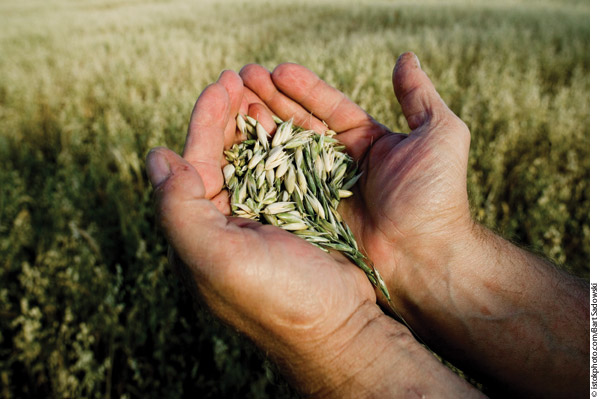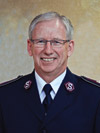 As October begins, our thoughts focus on the Thanksgiving holiday. We are challenged to look beyond the gift of a long weekend and reflect on the seasonal harvest made possible through the cycle of sowing and reaping. As Psalm 100:4-5 tells us, “Enter his gates with thanksgiving and his courts with praise; give thanks to him and praise his name. For the Lord is good and his love endures forever; his faithfulness continues through all generations.”
As October begins, our thoughts focus on the Thanksgiving holiday. We are challenged to look beyond the gift of a long weekend and reflect on the seasonal harvest made possible through the cycle of sowing and reaping. As Psalm 100:4-5 tells us, “Enter his gates with thanksgiving and his courts with praise; give thanks to him and praise his name. For the Lord is good and his love endures forever; his faithfulness continues through all generations.”
Throughout my life, I have joined in this spirit of thanksgiving as I admired the harvest displays at church, witnessed the financial offerings of Salvationists giving out of their abundance and shared in turkey dinners that bring family and friends to an expression of thanks. But it took a journey to a distant land—where seasons aren't so distinct and multiple harvests are possible—to realize that giving thanks is more than a season or calendar focus.
We now live in a time and land where most of us are removed from the realities of the seasonal harvest. We no longer witness the planting of seeds or await their growth. Instead, we buy our food from large supermarkets that are open 24-7 and replenish their shelves while we sleep. So as consumers and beneficiaries of food grown around the world, it can be difficult for us to reflect fully on the many scriptural principles expressed through the imagery of sowing and reaping.
An example of these biblical truths can be found in the Parable of the Sower (see Matthew 13:1-23). As Christians, we are challenged to view the seed as God's Word and our hearts as the soil that accommodates both sowing and reaping. In this scenario, a good harvest becomes more than just an abundant yield of produce, but rather Kingdom growth as people allow God to work in their lives. The ultimate outcome is described as the joy of harvest, which leads to thanksgiving.
There are implications for each one of us that must be considered as we observe the laws of the harvest. Personal sowing and reaping—whether done in error or successfully—prompts a predicable end result, yet we often appear surprised when we reap what we sow. I propose that at the centre of this reflection, our relationship with God the Father must come into focus. The biblical imagery suggests that the seed is the Word of God and the soil is the heart. Our sense of personal harvest is the outcome of our obedient faith in the God of the harvest, who demonstrates daily faithfulness.
Beyond the personal implications are the corporate responsibilities. In this, I refer to the Church and specifically to The Salvation Army. Every Salvationist has both the opportunity and challenge to engage with a world where fields are “white unto harvest.” Do our congregations sow seeds in such a manner that thanksgiving in the midst of harvest is an obvious and appropriate outcome? I long for the Army to discover its capacity to celebrate, with our Kingdom growth creating outcomes that lead even the angels in Heaven to rejoice (see Luke 15:7).
While I confess that my early impressions of thanksgiving were likely misplaced, today I find myself to be a little more reflective.
I view the world now very much aware of the destitute needs of others in comparison to my plenty. In some ways I am thankful for the unsettled feeling within when I see photos from such places as Somalia. May we never become oblivious to the needs of those whose harvest is little.
I am seeing the Army in the Canada and Bermuda Territory with fresh eyes. I want to thank God for growing saints, new people coming to know the Lord, new expressions of our ministry, more candidates and the list goes on.
I want to live a thankful expression of life and reflect the same in my daily experience.
I have much to be thankful for, but at the centre of it all is my gratitude for my salvation, my release from the burden of sins, God's daily grace and the great hope I share in a promised eternal inheritance. As we read in Matthew 13:8, “Still other seed fell on good soil, where it produced a crop—a hundred, sixty or thirty times what was sown.”
My prayer for Thanksgiving is that Salvationists, corps and centres will have sown seeds that are now ripe for harvest. Let the rejoicing begin as we bring our “sacrifice of praise” to the God we love and serve (see Hebrews 13:15-16).
 Commissioner Brian Peddle is the territorial commander of the Canada and Bermuda Territory.
Commissioner Brian Peddle is the territorial commander of the Canada and Bermuda Territory.










Leave a Comment